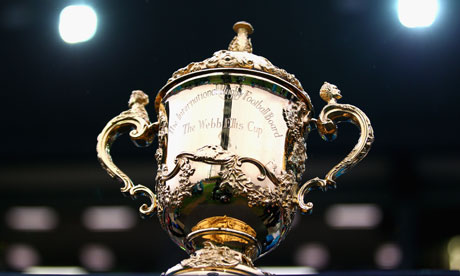
England will come under pressure to prove that they are in a fit state to host the 2015 World Cup despite the civil war that has been raging at Twickenham for most of the year, with the tournament organisers watching with mounting apprehension.
The Australian Rugby Union believes the International Rugby Board, whose income derives almost exclusively from World Cups, needs to assure itself that England remain on track to stage the tournament in four years' time given the current political turmoil at the RFU.
The ARU will bring up the issue at a Sanzar board meeting next week as the upheaval, exacerbated by England's poor showing on and off the field in this World Cup, shows no sign of being resolved.
The ARU chief executive, John O'Neill, said he was concerned that the feuding at the RFU, which is prompting clubs to call a special general meeting to propose a vote of no confidence in the acting chief executive, Martyn Thomas, will impact on the running of the next World Cup.
Clubs want Thomas not only removed as acting chief executive and one of the RFU's two representatives on the International Board, but also want him replaced as the chairman of the body that will run the 2015 tournament, a post that commands a £170,000 salary and which he will start once a full-time chief executive begins next year.
The ARU is not bothered whether Thomas stays in position or is forced out, although O'Neill said he respected him. All it wants is for the infighting, which has been taking place for most of the year, to be quickly resolved one way or the other so that whoever is at the helm can get on with planning for the 2015 tournament without any distractions.
"Given the responsibility that falls on the shoulders of a host union, the IRB might wish to seek assurances from the RFU that its current problems will not threaten its ability to stage the 2015 World Cup," said O'Neill.
"No one enjoys seeing a major union confronting serious governance and management issues within their own backyard," added O'Neill, who was disconcerted by reports that the sports minister in Britain, Hugh Robertson, was asking questions about the governance of the RFU. "It will be interesting to hear the answers."
Thomas said he had been asked by the IRB to reassure it that he would be remaining as chairman of the 2015 organising body. "I find that quite encouraging," he added, but it may be some months before he knows whether he will stay in the position. His main supporter on the IRB is the chief executive, Mike Miller, whose own position is far from secure after antagonising Sanzar this month.
Once the SGM is called by the clubs, the RFU will have 14 days to respond and it would then have 60 days to set a date, meaning the affair could stretch into the new year.
The RFU had hoped that a start date of 4 September for 2015 would be confirmed at the tier-one meeting, but the Sanzar unions refused to consider the issue alone and successfully argued that the financial distribution of the money made from the tournament and a relaxation of commercial restrictions on teams during a World Cup should be part of the mix.
"There is still quite a distance to go following the meeting on Monday in setting a start date for the 2015 World Cup, an issue which cannot be taken in isolation from compensation to the leading unions and a relaxation of the commercial rules," said O'Neill. "We cannot have a piecemeal approach."
The Sanzar unions had pushed for the start of the tournament to be put back until October, to allow them to play the Four Nations in full and were less than impressed when the RFU admitted after making its presentation that it prepared only for a September start.
The Six Nations delegates met an hour before the meeting and adopted a united front, even though Ireland had earlier privately expressed concerns about the financial model of the World Cup. Only when the Sanzar unions flatly said they might find competing unaffordable did the meeting agree that all the income lost by the major unions in a World Cup year would be made good.
The IRB will spend the next two months drawing up proposals and reporting back to the executive in December.

